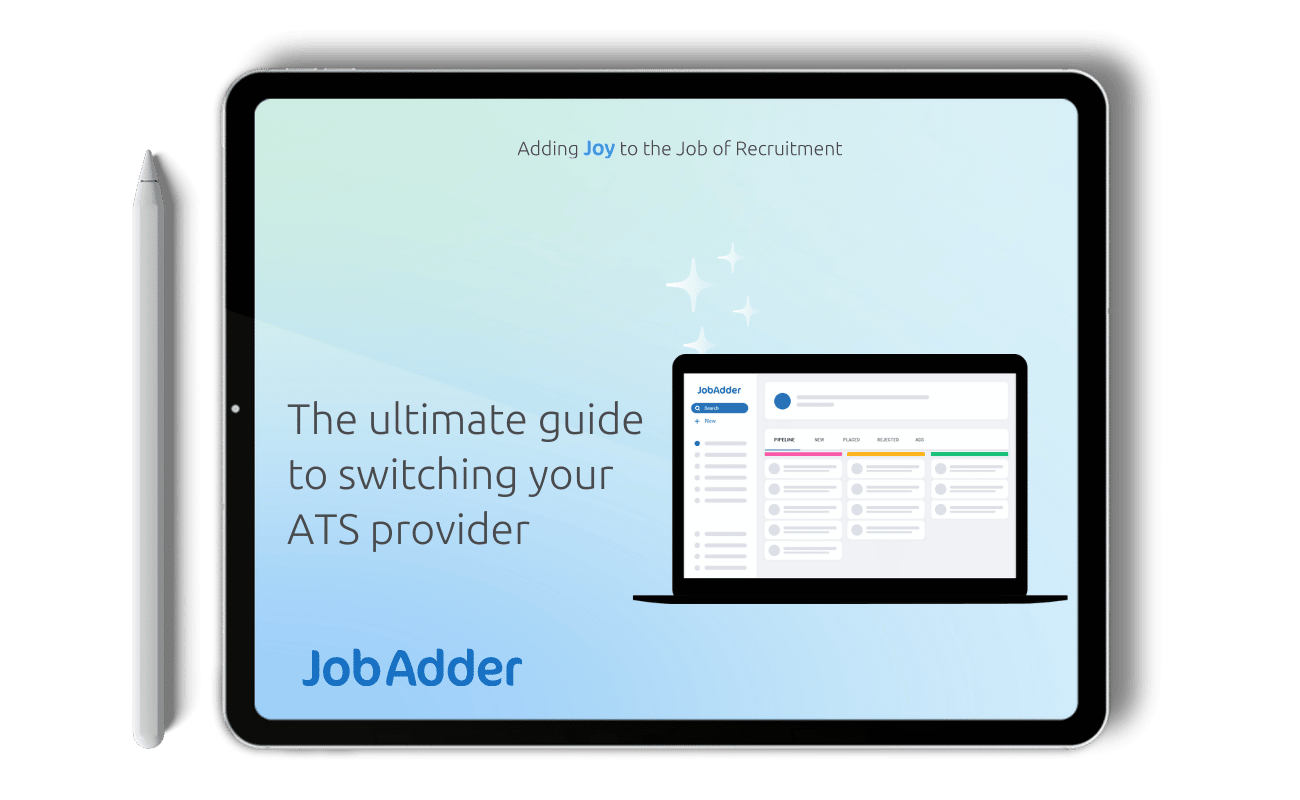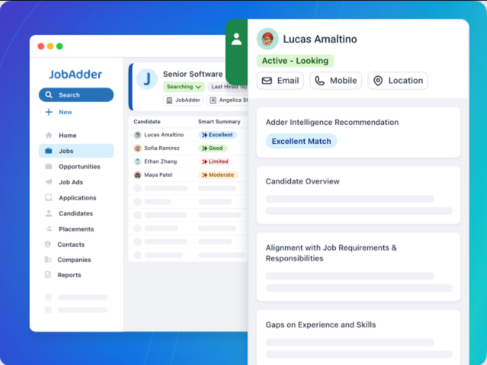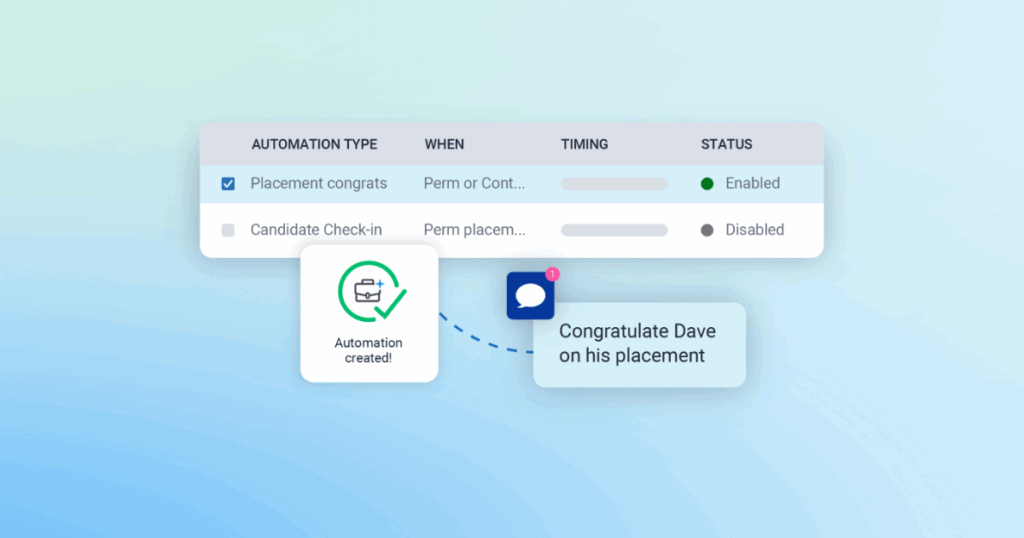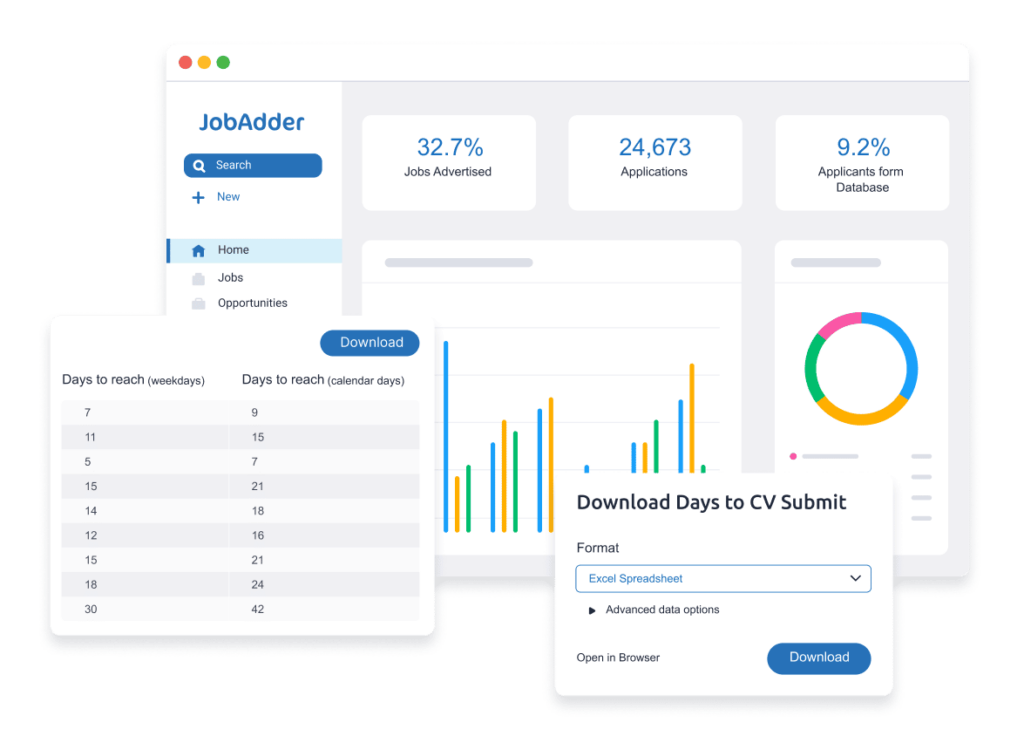A candidate relationship management (CRM) system, also known as a talent management system, needs to be an essential part of your recruitment process and strategy.
Paired with the power of an applicant tracking system (ATS), a recruitment CRM system can help you attract, manage and ultimately hire the best talent for the job.
A recruitment CRM is a centralised place to set up streamlined communications between hiring managers and candidates. It can also encourage proactive recruitment, so you can nurture and grow your talent pool with flexibility, even if you aren’t actively looking for new employees.
Finding the right talent for the job is an ongoing process, and talent management isn’t easy. In this blog, we’ll explore how a recruitment CRM can automate and improve your hiring process. Read on to discover how a CRM solution can help your recruitment agency or in-house talent acquisition team.
DOWNLOAD OUR FREE EBOOK: The ultimate guide to switching your ATS provider
What is candidate relationship management (CRM) and how does it work?
Effective candidate relationship management systems are modern recruitment software designed to keep active candidates engaged and interested throughout the evaluation and hiring process.
At the same time, the CRM software nurtures passive candidates, keeping them interested. These passive candidates form your organisation’s talent pool, representing an important source of quality candidates.
A CRM is typically shown as a dashboard hub, providing a centralised view of candidates and data for hiring managers and recruiters. In this dashboard, you can see candidate communications, important dates, top candidates and candidate profiles to make the recruiting process simpler. This recruitment software replaces the need for endless spreadsheets, pages of notes and unnecessary meetings.
What does a candidate relationship management system do?
A recruitment CRM often offers a range of great features to simplify your talent pooling and candidate communications. Below are some of these features:
- Builds detailed profiles: Your CRM holds all the data and information you collect on candidates, allowing you to develop a talent pool of qualified candidates you can refer to. Recruiting teams can easily refer to these profiles when trying to fill a position.
- Automation: CRMs can be set up to send automated emails, SMS and messaging to enhance candidate engagement. Having this level of automation can take the weight off the recruiting team’s shoulders, allowing them to communicate personally with the most qualified candidates while keeping passive candidates engaged.
- Candidate sourcing: Your CRM can send job ads to relevant candidates via bulk email campaigns. It uses information from submitted resumes to match qualified candidates to specific roles and interests.
- Stores and tracks candidate data: Writing notes on paper applications or trying to sort qualified candidates from the less impressive ones in an Excel spreadsheet can turn into a mess very quickly. CRM systems can store and track all your data, so it’s easily accessible. This data will include not only self-reported data from candidates but also notes taken by the recruiting teams. This function creates detailed profiles for review down the road.
- Recruitment metrics and analytics: What’s the point of having all this data if you’ve not going to analyse it? Data-driven decision making is more important than ever in recruitment and a CRM can provide you with the insights you need.
- Centralises for candidate engagement: As mentioned, having one centralised system where you can engage candidates is a whole lot easier than using multiple different tools, for both recruiters and the candidates.
- Integrates with your ATS software: ATS software, or applicant tracking system software, can be integrated completely within a CRM system. The two can work in tandem to categorise and build profiles from candidate resumes and automate and track the entire application process.
Better recruitment and talent acquisition: The benefits of a candidate relationship management system
Since the introduction of this technology, recruiters and candidates alike have experienced the benefits of ATS and CRM systems. The technology has improved how recruiting teams can track and communicate with candidates.
For hiring managers that know the struggle of organising resumes and finding vital information on a candidate, these systems are a blessing.
A recruitment CRM has the following benefits that significantly improve the hiring process for recruiters and talent acquisition professionals:
Streamline candidate sourcing
A CRM system can automate more than 90% of the hiring process, freeing up the humans to do the trickier (and more human) parts of the process.
The system groups candidates in terms of qualifications and experience, making the information easily searchable and accessible. A CRM uses AI for better candidate sorting, saving recruiters and hiring managers time and effort.
CRMs can do wonders for candidate workflows, helping streamline the hiring process, and making the steps clear to parties on both ends of the exchange. When a CRM system integrates with an ATS, it makes life easier for both candidates and recruiters.
CRMs focus on proactive recruiting, meaning they attract both active and passive candidates to your talent pool, even when you’re not looking for new hires. This function increases your chance of finding the right candidate quickly once you do need to add another team member on short notice.
Develop and nurture your talent pool and pipeline
A well-rounded talent pool will include current candidates for open roles, past candidates who didn’t get the position they applied for and potential candidates for future job openings.
Your talent pipeline is the funnelled version of your talent pool. It includes engaged candidates that can be contacted when relevant roles come up. Quality candidates funnel down the talent pipeline for further evaluation.
The key here is that the CRM system works to elevate ongoing candidate interest in your organisation using career sites, job boards, previous applications, social media and more. These actions keep candidates coming into your talent pool and pipeline.
Build candidate profiles
A recruitment CRM collects and compiles data and information on candidates, building candidate profiles with interests, experience, how they found the job posting and any notes from recruiters or hiring managers.
Storing candidate profiles makes the hiring process a breeze when a position opens. The candidate profiles allow recruiters and hiring managers to follow a data-driven recruitment process based on information gathered by the CRM system.
Rather than flipping through pages of resumes or trying to read the tiny cells in an Excel spreadsheet, the CRM will show you the perfect potential candidates.
Provide a great candidate experience and advance your employer brand
The last thing you want is a candidate having a bad experience with your hiring process, which may hinder your employer brand and discourage other candidates from applying. Having a concise and pleasant candidate experience can advance your company’s reputation and attract new candidates to your (metaphorical) door.
The notes and communication history available to recruiters on candidate profiles mean you can deliver personalised communication, leaving the candidate feeling valued and wanted no matter the result of the application. With CRM automation, communication will be more frequent, ensuring candidates remain engaged as you evaluate other candidates.
Reduce hiring costs
CRM software will streamline the hiring process, saving you money on job ads and candidate outreach.
The benefits of a talent pool and a vetted talent pipeline are that your hiring is simplified, you fill roles faster and there’s less of a drain on your organisation’s energy and resources.
The importance of candidate relationship management
So, it’s clear that a candidate relationship management system can automate and streamline a bunch of manual tasks in your hiring process and improve it for the better.
Embracing the advanced technology that combines a CRM solution with ATS software, as we do at JobAdder (hint hint), allows recruiters and talent acquisition professionals to focus on the things that bring them joy in the job of recruitment, rather than the mundane and manual. Find out more by having a chat with our team.
Not sure what’s involved in switching your ATS? Download our step-by-step guide.





